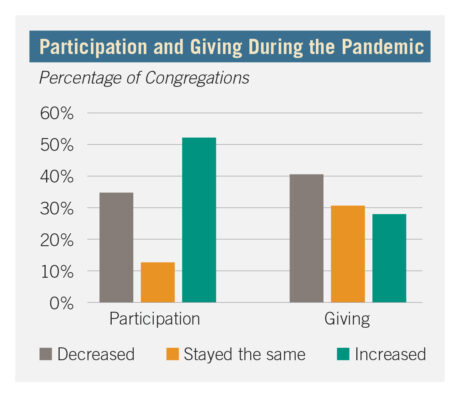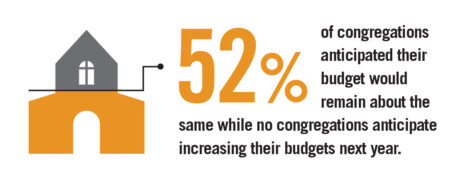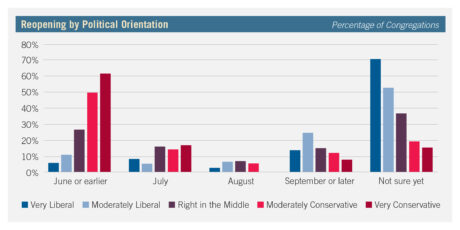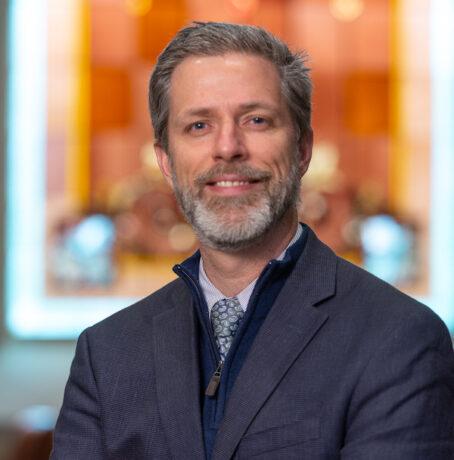Facing an Uncertain Future
Facing an Uncertain Future
Religious Organizations Facing Theological, Financial, and Political Pressures
By David P. King, PhD
This past week, Lake Institute released findings from our recent Covid-19 Congregational Study. We asked congregations to reflect on how they managed their resources in the midst of the compounding crisis they have faced since March. We also asked how they were looking to the future in terms of giving trends, budget planning, and reopening for in-person services. Religious organizations are entering what are often their busiest seasons with no clear direction for how to respond during these unprecedented times. Jewish synagogues, usually packed for the High Holy Days, created virtual or hybrid Rosh Hashanah services this weekend. Many Christian congregations are contemplating budget planning and pledge campaigns asking congregants to support the church for the next year amidst ongoing uncertainty. As all congregations are planning for their financial futures, they are asking themselves important questions about what comes next.
Our Lake Institute survey documented how congregations have responded in the midst of the pandemic since March. Overall, congregational giving declined by 4.4% on average from February through June 2020 compared to the same period in 2019. A plurality of congregations (41%) reported experiencing a decrease in giving, while more than a quarter (28%) said giving increased.

Sixty-five percent of congregations surveyed received federal Payroll Protection Program loans. Just 14% of all congregations reported having to make reductions, layoffs or furloughs of staff. Like most nonprofits, most sought first to control expenses by cutting administrative expenses. Yet, 30% of congregations raised funds to support other congregations and nonprofits in need. We found that those that had established mechanisms and cultures of online giving alongside consistent communication with their members, as well as an ongoing focus on their mission and values, fared better than those that did not.
When asked to look to the future, not a single congregation surveyed expected to increase its budget during the next year. The majority (52%) plan to maintain their current budgets, while 48% anticipate reductions, with most of those anticipating cuts in the 5% to 10% range.

Of course, holding budgets steady in the midst of these current times may be a great success. With everything leaders are managing, holding budgets flat probably makes sense as they are facing increasing anxiety, multiple unknowns, and perhaps paralysis in knowing how to respond. Most congregations are seeking to manage expenses similarly in the year ahead as they have managed in 2020. They are cutting administrative expenses and trying to maintain staff even while drawing down reserves and developing new fundraising appeals. How congregations respond to the current pandemic may be the question for their future. As all congregations must now respond to a new normal, how they adjust their economic and organizational models to these new contexts may shape the American religious landscape for many years to come.
One of the biggest questions congregations face at present is when and how to reopen. Just over half (53%) of congregations reported that they had already resumed in-person services or anticipated doing so by September 1. One-third of congregations indicated that they did not know when they would reopen. Yet, at some point this summer, it appeared that politics over public health reshaped the discourse of reopening, as congregations’ political orientations seem to have had a greater effect on plans for reopening than did public health or financial considerations. Nearly three-quarters (71%) of conservative congregations had reopened or planned to reopen by August for in-person religious services, compared to 20% of liberal congregations and 49% of moderate congregations.

With an increasingly polarized response to the pandemic, a presidential election, and now a Supreme Court appointment intermixed with economic realities, public health, and spiritual wellbeing of local communities, religious leaders are facing complex decisions. In our sample, as of July, 57% of congregations reported that the majority of their congregational members supported maintaining online-only religious services. Another 24% reported their congregations were “evenly split” on the issue.
In some ways, what we found in our survey is no surprise. Leading a religious organization in these current contexts is undeniably complex. For those congregations that continue to meet online, will “Zoom fatigue” affect participation and giving or will it allow for new opportunities to reset the organization’s mission and programs? As all congregations respond to a new normal, how will they meet new financial and institutional challenges in adjusting their economic and organizational models to new contexts? The answers are not clear; however, we find religious leaders to be resilient, innovative and up to the task of leading their congregations and communities through uncharted waters in matters of faith and finances. Cultural, social, and political issues add another layer to these questions. How congregational leaders mediate the theological, financial, and political pressures that they will continue to face in the days ahead will define the American religious landscape for the next decade.
Expanded Perspective
by Andy Williams, William & Edie Enright Fellow, IU Lilly Family School of Philanthropy
Politics and religion have a significant if not complex relationship. One example of this complexity may be illustrated through the political content of sermons. Our National Study of Congregations Economic Practices (NSCEP) interviewed nearly 100 clergy from a variety of religious traditions across the country.
Among other questions, we probed their decision-making process when choosing whether or how to discuss contemporary political or social issues in sermons. Not surprisingly, individuals approached the question through a variety of lenses; and often enough, the same underlying reasoning could lead to different, even opposite, results.
Theological concerns compelled many interviewees in their approach to politics and preaching. On the one hand, theology led some clergy to passionate political engagement from the pulpit. For example, one respondent “lets the scriptures dictate” what they preach about and that has included racism, exclusion and white supremacy. On the other hand, one respondent talked of perceived expectations from various congregants from both sides of the left-right political divide but said, “certainly there are times I pulled my punches…” Other theological reasoning included pastoral care (not wanting congregants to feel isolated for their political views) and the closely related desire for congregational unity.
In a different direction, many respondents discussed non-theological rationales. Some clergy expressed concern that perceptions of politically partisan preaching may impact financial donations. This extended in some cases to merely discussing issues like immigration or racism without explicitly taking a particular political position. In addition, numerous respondents spoke about principles of effective communication. Another pastor stated, “I try to balance my own convictions and my idea of the need to be heard.”
The NCSEP interviews show that many clergy of diverse religious and political views carefully consider the political content of their sermons and its implications. We suspect that congregants would appreciate hearing how their religious leaders consider whether and how to preach on difficult political, social and cultural topics. At the same time, it is clear that these are questions that many religious leaders struggle to know how to address. The question of reopening congregations to in-person services is another example of a sensitive topic that leaders must navigate with care and concern for all of those entrusted to their care.
Subscribe
Insights, a bi-weekly e-newsletter, is a resource for the religious community and fundraisers of faith-based organizations that provides:
- Reflections on important developments in the field of faith and giving
- Recommended books, studies and articles
- Upcoming Lake Institute events
